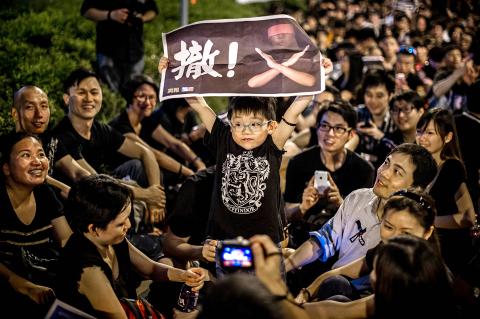|
HK backs down on
¡¥patriotism¡¦ classes
POWER TO THE PEOPLE: A policy that would have
put Chinese patriotism classes in Hong Kong¡¦s schools was scaled back after
demonstrations by outraged citizens
AFP, HONG KONG

A child holds a placard as
protesters sit near the government¡¦s headquarters in Hong Kong on Friday during
a demonstration against plans to introduce Chinese patriotism classes. Hong Kong
goes to the polls today to elect a new legislature that will lay the ground
rules for full suffrage.
Photo: AFP
Hong Kong¡¦s government yesterday backed
down on a plan to force children to take Chinese patriotism classes, after
thousands took to the streets in protest ahead of legislative polls.
Organizers said 120,000 protesters rallied outside the government headquarters
late on Friday, but police put the number at 36,000, a marked escalation in
demonstrations which have waxed and waned for 10 straight days.
The protests began in July when tens of thousands demonstrated against what they
say is a Bejing-imposed policy to brainwash children with Chinese Communist
Party propaganda. Since then the demonstrators have become a daily feature at
the executive building and a major headache for the pro-Beijing government
leading up to today¡¦s elections for Hong Kong¡¦s Legislative Assembly.
Some protesters staged hunger strikes and students had erected a replica of the
democracy statue that symbolized the student-led 1989 Tiananmen Square protests
in China.
The city¡¦s Beijing-backed leader, Hong Kong Chief Executive Leung Chun-ying
(±ç®¶^), had rejected demands to meet the students, saying he would not negotiate
the withdrawal of the policy he inherited from the previous government in July.
However, in a dramatic about-face on the eve of the election, Leung held a press
conference late yesterday to say the mandatory aspect of the policy had been
scrapped.
¡§The amendment of this policy means that we are giving the authority to the
schools,¡¨ Leung said, dropping the 2016 deadline for the curriculum to be taught
in all primary and secondary schools. ¡§The schools are given the authority to
decide when and how they would like to introduce the moral and national
education.¡¨
Leung also promised to re-examine the entire curriculum in the light of the
public outcry.
The government, formed after a small group of largely pro-Beijing elites
appointed Leung earlier this year, had insisted the subject was important to
foster a sense of national belonging and identity.
Government-funded course material extolled the benefits of one-party rule,
equated multi-party democracy to chaos and glossed over events like the mass
starvation of former Chinese leader Mao Zedong¡¦s (¤ò¿AªF ) regime.
The administration now appears to have caved in to public opposition amid rising
anti-Beijing sentiment in the semi-autonomous city, which enjoys a degree of
democracy and freedom not allowed in mainland China.
Lawmaker Anna Wu, who chairs a government committee studying the policy, said
the authorities decided on a course of action that was ¡§the most inclusive and
most liberal.¡¨
The new 70-seat legislature elected today will pave the way for full suffrage,
which Beijing has promised in 2017 for Leung¡¦s job as chief executive and by
2020 for the parliament.
Pro-democracy parties were using the education furore to galvanize their
supporters, hoping to boost their representation in parliament and maintain a
veto over constitutional amendments.
Just over half of the incoming legislature will be directly elected, with the
remainder chosen by relatively small ¡§functional constituencies¡¨ organized along
professional and sectoral lines and generally loyal to Beijing.
|
![]()
![]()
![]()